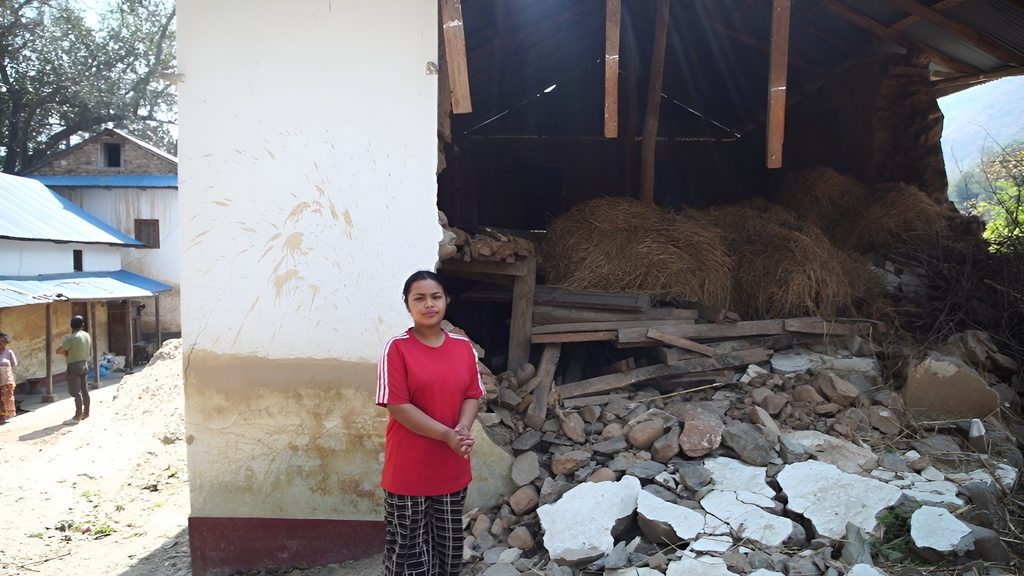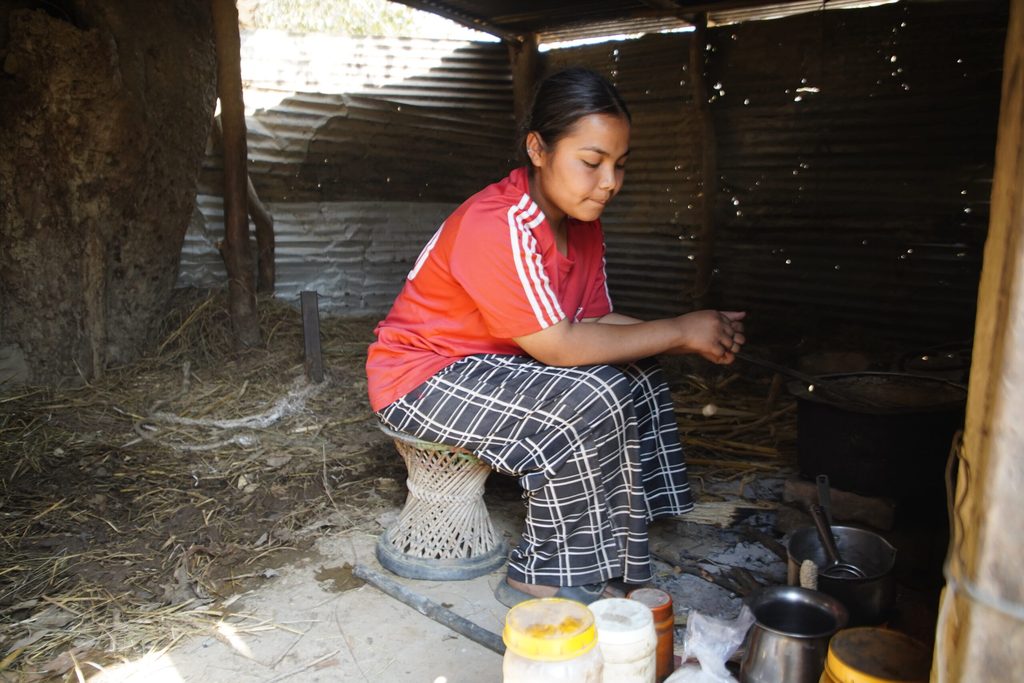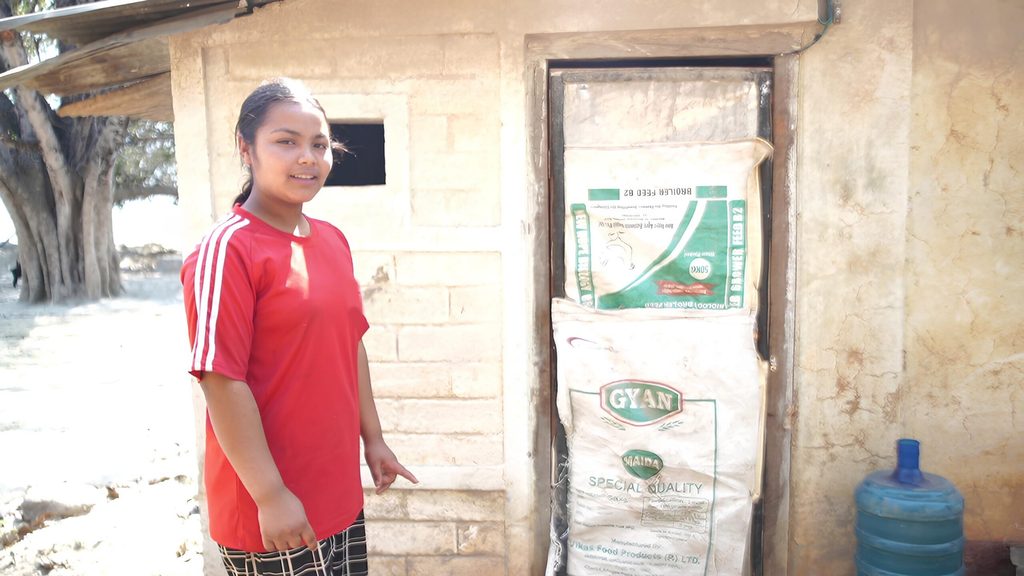My life after flood
Durga, an 18-year-old from Sindhuli, is a resilient girl who faced the fear and loss of last year’s devastating flood that swept through her village. Let’s hear her story in her own words.

I still remember the night it all changed. A strange sound outside woke me up. At first, I didn’t know what it was. Then, I felt the cold water seep into my room. Panic set in when my mother shouted for us to leave immediately. We grabbed whatever we could and ran to the school ground. By morning, our home was gone, washed away by the flood. Our kitchen, our beds, our books, and everything was destroyed.
I am Durga, an 18-year-old girl from Sindhuli, and this is my story of surviving the flood that hit my village on September 28, 2024. My house, which stood about 60 meters from the riverbank, had always been safe from the water. Sometimes, there were splashes, but never anything like this. This time, the flood swallowed everything. When we returned after a month of taking shelter at a relative’s house, our home was buried under piles of sand. We spent weeks just digging it out. Even now, cracks run along the walls, and the house next to ours has completely collapsed. I worry that if an earthquake strikes, our house might not survive.
“By morning, our home was gone, washed away by the flood. Our kitchen, our beds, our books, and everything was destroyed.”
Durga, Sindhuli
Struggling for basic needs
Surviving after the flood was just as hard as escaping it. Clean drinking water was scarce, and food was difficult to cook since we no longer had a kitchen. For months, we cooked in our cattle shed, inhaling smoke and enduring the discomfort of sharing space with animals.
Menstruation became another battle. Before the flood, I could sometimes afford sanitary pads; many times, I received them from my school, but after losing everything, they became a luxury we couldn’t afford. We had to use pieces of cloth, but I didn’t know they had to be cleaned and dried properly. I often suffered from rashes and infections, but there was nothing I could do.
Buying sanitary pads became impossible. We had to use cloth, unaware that it needed to be clean and soft. It made me feel ashamed and uncomfortable, but there was no other option.
The flood also destroyed our crops, which were our only source of income. My parents are farmers, but since the land is registered under my grandparents’ name, we have no legal claim to it. We lost one of our buffalo, and without enough land to grow food, every meal became a struggle.


Fighting for my education
Despite everything, I refuse to give up on my education. I am preparing for my SEE (Secondary Education Examination) exam, but every time dark clouds appear, fear grips me. What if the flood happens again? What if we lose everything once more? Some nights, I can’t sleep, thinking about how our lives were turned upside down in just a few hours.
My education is the only thing that can change my future. If I stop studying, I will be stuck in this cycle of struggle forever.
But affording school supplies and admission fees is difficult. I want to continue my studies, but I know I must work to support my family too. Sometimes, I wonder if I will have to give up school like many other girls in my village. But I don’t want to. I dream of something better, and I am determined to make it happen.
“My education is the only thing that can change my future. If I stop studying, I will be stuck in this cycle of struggle forever.”
Durga, Sindhuli
Rebuilding our lives
The support from the organisation has given us hope. They provided us with food, blankets, and bed sheets in the immediate aftermath. Later, after 6 months they helped us rebuild our kitchen, giving us cooking utensils, mosquito nets, clothes, and sanitary pads. Finally, I don’t have to cook in the cattle shed anymore.
Having cooking utensils again means so much. Plan International Nepal’s help has made our struggles a little easier.
I was especially excited when I received the hygiene materials. The sanitary pads will last me for at least 3 months! I don’t have to worry about managing my period for now. The soap, towels, and brush make me feel fresh and clean again after so long.
The blankets and black mat were also a huge relief. At night, the cold makes it hard to sleep, but now we have something warm. It feels like a small comfort in the middle of all this hardship.
The quality of the products made a big difference. The pads are soft and comfortable, and I don’t have to worry about leaks. The soap smells fresh and lasts long, and the towel is thick enough to dry properly even in this humid weather.
One of the most thoughtful items we received was the mosquito net. I had been so worried about getting sick from mosquito bites. With the net, I feel safer from diseases like malaria and dengue.
While our house is still damaged, and our future remains uncertain, I hold onto hope. The flood took away so much, but it didn’t take away my determination. I will continue to fight for my education, my well-being, and my dreams. Because I know that no matter how many storms come my way, I am stronger.
About the humanitarian response
In close collaboration with local governments and implementing partner organisations, Janaki Women Awareness Society and Janjati Society Development Programme, Plan International Nepal delivered a swift and inclusive humanitarian response across Saptari, Sarlahi, and Sindhuli affected during the late September 2024 flood. Relief packages—including hygiene kits, winterisation kits, and kitchen supplies—were distributed to 1,957 households, reaching 12,239 individuals.
The response prioritised vulnerable and marginalised groups, supporting 1,407 children under five, 2,175 adolescents, 797 senior citizens, and 465 Dalit households. With 6,291 males and 5,948 females, the effort was both inclusive and impactful.


